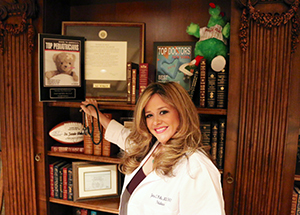Everyone Needs a Pediatrician - No Matter Your Age!

By Jamie Leigh Wells, MD, FAAP
As a medical expert, I can attest pediatricians are the best. Full disclosure: I am a pediatrician. Since I believe in transparency and champion the phrase hypocrisy is my favorite, know that I am (and am not) biased. The world would be a happier and possibly healthier place if no one aged out of their pediatric provider. With that said, by the end of this article, you will appreciate why college students (and their families) so cherish this invaluable relationship and often fight the discharge from care. Additionally, you will be convinced, at the very least, no matter if you are 28 or 88 that befriending one may not necessarily secure longevity, but will certainly enhance your well-being, empower you to advocate for yourself, and assure you are seen as a whole person.
Having a child is the grand equalizer. This fact traverses socio-economic strata, ethnicities, sexual preference, gender identity, age at first parenthood and so on. Whether a CEO or circus performer from the USA to Bhutan, becoming a parent carries a weight of worry that was not previously known.
These days, in the adult medicine world, allegiance to the primary care physician can be fleeting with insurance changes and expanding regulations. It’s quite the opposite in pediatrics. With every patient, we garner at least an entire family. If they like you, then they do their best to remain. It is a tremendous responsibility and privilege to assume this role. It shapes the child’s lifetime view of health care and its delivery. If a parent trusts you with their child, then they tend to seek your guidance in their own, their spouses and extended families medical decisions often before consulting or proceeding with the recommendations of their actual physician! Often, they express the desire for you to become their doctor too.
It is common for us to enter a patient’s sphere before delivery. It is our job to know struggles with infertility, eventful births, uneventful pregnancies and inheritable conditions. Mom and dad’s history is baby’s history. It is an era of “firsts” that we experience together. We know the first growth spurt—an inevitable reality for most patients. First successes and failures. First triumphs and losses. First puberty, periods and sexuality discussions. College admissions. Discoveries of one’s passions. We are present for all of the major milestones. We function from a place where all decisions are based on the best interest of the child. It allows adolescents, in particular, to have an objective third party in navigating challenging periods with parents. A third party that encourages their autonomy as they mature to become self-reliant, adaptable and independent adults.
A giant misperception about pediatrics is that we are exclusive baby doctors. Not so! To a significant degree, children can get what adults get. Personally, I trained at a Cystic Fibrosis Center where I cared for 30- and 50-somethings admitted to the pediatric ward since adult doctors were less knowledgeable of the ailment. Before treatment advances, those with this genetic malady didn’t survive into adulthood. We are experts in the development of all life stages from embryologic in the womb through the continuation of adolescence into young adulthood.
Some pediatricians specifically continue in fellowships to shift their focus exclusively to neo-natals or young adults, but this is why when you are at your pediatrician’s office one room has a micro-premie while another is occupied with a 6-foot 4-inch college defensive linemen. As it happens, one office might cut off patients at 18, another at 22. This is typically a result of the hospital affiliation as the policies deviate between facilities. Continuity provides the highest quality of care. If a pediatrician admits a patient to a hospital where after midnight on his 19th birthday he is taken to the adult floor, then it is quite common the doctor cannot formally manage the patient in-house as he/she has privileges that only cover the pediatric floor. Therefore, his office may cut off at 19.
Adolescence continues until the mid-twenties, in some instances even beyond. This is when bone density peaks as well as brain development transitions. Most groups tend to treat through college as this is a period of significant change. We are the stability in that change. In general, young adults tend not to seek medical care but are more inclined to go where they trust. They find comfort in the staff, the surroundings, the history of pranks pulled, laughter and tears shed. It is a community. Plus, even the few who were over being around babies and wanted to go to an adult doctor repeatedly returned when they realized hugs, lollipops, and handholding with shots were not the norm. Ultimately, this segment begged the most not to be kicked out at 22. Grownups are frequently resistant to change and less at ease with ambiguity and facing the unknown, should kids be any different? For the most part, however, the conversation regarding replacement occurs between patient and doctor years before it takes place. Individual recommendations are offered to suggest who might be a good fit. But, despite the fact the Affordable Care Act allows children to remain on their parent’s insurance through 26, not all healthy young adults want to or can see certain providers. If they are at ease, then the option should exist as long as the doctor possesses the requisite expertise. Otherwise, they just won’t go. The adult health care system cannot immediately compete with the bond formed over years with an individual’s pediatrician.
Many patients have wanted and continued to stay once they have had their children. I have signed yearbooks. I’ve been the talk of “My Doctor is Better than Your Doctor” Facebook feeds—only for the litany to discover they shared a physician. Attended surgeries to assuage fears. Dropped by birthday parties, celebrated Sweet 16’s, and done home visits. I’ve seen top executives out-debated by teenage sons and daughters. We hold their memories, witnessed panics, ridiculous scenarios, and accidents of all types while also consoling after traumas. We have a lot of patience. We know that we can cure an illness. Our training is about solving root problems, genuinely seeing the entire patient and discovering ways to facilitate the thriving of a family.
I saw my pediatrician and pediatric dentist through medical school. I even tried to age-down at my final dental visit, unsuccessfully. Later in life, when I enforced the patient cut-off policy as a pediatrician, we further bonded over our mutual efforts to hold on and cajole.
Bottom line: If you aged out and can’t see one, befriend one! I am currently the “unofficial” pediatrician of a few geriatrics and contemporaries. Additionally, if you don’t mesh with your doctor, then find one with whom you do. Only then will it be a therapeutic relationship that enhances and augments your life.

Jamie Leigh Wells, MD, FAAP is a Yale educated, Board Certified Pediatrician with over a decade of experience caring for patients. Follow her on Twitter @jamiewellsmd and check out getwellsmd.com.



